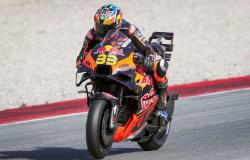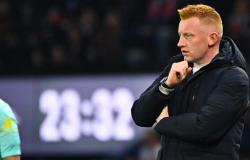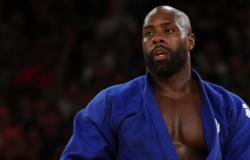Czech NHL legend Dominik Hasek, known for his outspoken and often controversial opinions, expressed anger in the carpet over the recent trip of Kent Hughes, Vincent Lecavalier and Nick Bobrov to St. Petersburg to assess the development of 'Ivan Demidov.
On social media, Hasek denounced what he considers a “moral affront” in the context of the war in Ukraine, an outing that fueled heated controversy.
“This is unacceptable. By going to Russia, a nation currently at war, they indirectly legitimize an oppressive regime. Sport cannot be separated from politics in this case”Hasek said in a tweet shared thousands of times.
“The NHL should intervene to prevent this type of behavior that supports the Putin regime. »
Hasek's comments resonated with some international supporters and analysts, but they also sparked pushback.
While some salute his courage for denouncing a situation that they consider morally unacceptable, others criticize him for getting involved in geopolitics without nuance.
One Internet user summed up a feeling shared by many:
“Dominik Hasek was an exceptional goalkeeper, but he has no legitimacy to play the expert in international politics. The Canadian acts to protect his young player, not to validate a regime. »
But Hasek continued his offensive.
“As chief executive, Kent Hughes bears an enormous responsibility. By going to Russia, he sends a dangerous message to the rest of the world: that sport can ignore human suffering. This is inexcusable. »
“Hockey has always been a sport that brings people together, but this type of decision creates a divide. How can we claim to advocate values of respect and justice while collaborating with a country that attacks civilians every day? »
“How can we explain to Ukrainian families, who have lost loved ones in this war, that a Canadian hockey organization is going to pose for photos with Putin's allies? This is a blatant lack of respect for all victims. »
On the Canadian side, this trip to Russia has nothing political. The decision by Kent Hughes and his team responds to an urgent need: to support Ivan Demidov, their first round pick, in the face of chaotic and politicized management of the St. Petersburg SKA.
Demidov, brilliant despite limited playing time, is the victim of blackmail and a hostile climate because of his intention to join the NHL.
Nick Suzuki, captain of the Habs, was keen to emphasize the importance of this approach:
“It is essential to show our young players that they are supported, no matter where they are. Ivan is part of our future, and this trip is a strong gesture on the part of the organization. »
Hasek's criticisms, while motivated by a desire to defend moral values, seem to ignore the broader context.
The Canadian never sought to legitimize Vladimir Putin's regime, but rather to protect a young player in a difficult situation.
The KHL, and particularly the SKA, is known for its authoritarian methods, and this trip was intended to reaffirm the organization's commitment to Demidov.
For the leaders of the Canadiens, this controversy is regrettable, but necessary collateral damage. Kent Hughes, in a brief statement, simply mentioned:
“We do what is necessary for the good of our players. »
As the war in Ukraine continues to divide opinions, this controversy illustrates the difficulty of navigating between sport and politics.
But for the Montreal Canadiens, the objective remains clear: prepare for a future where Ivan Demidov can fully flourish in the NHL.
Hasek's exit, although emotional, risks above all distracting attention from the real sporting issues.
The debate remains open, but one thing is certain: Canadians will not back down in their support for their young hopes, regardless of borders.
The trip of Kent Hughes, Vincent Lecavalier and Nick Bobrov to Russia has provoked virulent reactions, not only in sports circles, but also among experts in international politics.
The latter denounced what they perceive as an irresponsible action in a geopolitical context marked by the war in Ukraine.
Loïc Tassé, professor of politics and columnist for the Journal de Montréal, described the visit of the Montreal Canadiens delegation to Russia as “odious and execrable”, emphasizing the image that this decision projects internationally:
“It’s a very bad idea, because they send the message that they are legitimizing Vladimir Putin’s regime. Indirectly, Canada is at war with Russia, and this gesture is completely out of step with the country's official position. »
Since Russia's invasion of Ukraine in February 2022, Canada has strongly condemned Moscow's actions.
The Canadian government has imposed economic sanctions on many Russian oligarchs, including St. Petersburg SKA coach Roman Rotenberg, whom the Canadians met during their visit.
For Tassé, this trip sends a signal contrary to Canada's efforts to isolate Russia on the international stage.
He criticizes the Canadian for having favored his “small sporting interests” to the detriment of “major global issues”:
“The management of Sainte-Flanelle seems totally disconnected from reality. By going to Russia, she reinforces Putin's propaganda and offers a symbolic victory to his regime. »
Jean Lévesque, professor of history at UQAM and director of the Eurasia Observatory, also expressed his reservations. For him, this trip could be used for propaganda purposes by the Russian regime:
“The Kremlin exploits every interaction with Western figures to legitimize its actions. The photos of Kent Hughes and Roman Rotenberg, all smiles, will probably be presented in Russia as a sign of normalization of relations with the West. »
Lévesque emphasizes that the KHL, led by figures close to Russian power, is already a propaganda tool for Putin.
This visit could reinforce this symbolic role by showing that even the Canadiens, a legendary institution of the NHL, deal with them.
Experts also drew comparisons with other similar situations, including FIFA's decision to award the 2034 World Cup to Saudi Arabia, a state often criticized for its human rights violations.
According to Tassé, the Canadian's trip is part of this trend where sporting interests come before ethical considerations.
“Whether in hockey or soccer, Western sports leaders seem ready to turn a blind eye to troubling political realities to protect their interests. This sends a dire message. »
Critics also point to the moral impact of this decision, particularly towards Ukrainians who are directly suffering the consequences of the war.
For Lévesque, this trip is difficult to defend from an ethical point of view:
“Imagine explaining to a Ukrainian widow that Canadian leaders are going to Russia, a country that bombs its territory daily, to discuss hockey. It's incomprehensible. »
Beyond geopolitical criticism, some experts also denounce the cultural and political incomprehension of the Canadiens' leaders.
Tassé says this trip demonstrates a certain naivety or lack of sensitivity to the broader implications of their actions.
“Sport is not a bubble disconnected from the rest of the world. By doing so, the Canadian sends a message that can be interpreted as tacit approval of Russian actions. »
The Canadian's trip to St. Petersburg, while motivated by the development of a key player like Ivan Demidov, is seen by policy experts as a strategic and moral misstep.
Critics point out that in a world where the lines between sport and politics are increasingly blurred, sports organizations must be aware of the implications of their decisions.
For the Canadian, this trip could have repercussions well beyond the ice.
Kent Hughes will have no choice in explaining himself. The fact remains that in the end, he is not the culprit of this war.
He just wanted to support his hope.





